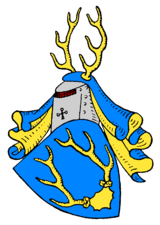Praschma
- View a machine-translated version of the German article.
- Machine translation, like DeepL or Google Translate, is a useful starting point for translations, but translators must revise errors as necessary and confirm that the translation is accurate, rather than simply copy-pasting machine-translated text into the English Wikipedia.
- Consider adding a topic to this template: there are already 9,160 articles in the main category, and specifying
|topic=will aid in categorization. - Do not translate text that appears unreliable or low-quality. If possible, verify the text with references provided in the foreign-language article.
- You must provide copyright attribution in the edit summary accompanying your translation by providing an interlanguage link to the source of your translation. A model attribution edit summary is
Content in this edit is translated from the existing German Wikipedia article at [[:de:Praschma]]; see its history for attribution. - You may also add the template
{{Translated|de|Praschma}}to the talk page. - For more guidance, see Wikipedia:Translation.


Praschma or Pražma (fully Praschma of Bilkau and Falkenberg; Czech: Pražmové z Bílkova or Páni z Bílkova; Polish: Prazma) is a Moravian noble family.
Notable members include Jan Nepomuk I. Ferdinand Pražma (1726–1804), the founder of the Czech village Pražmo;[1] Friedrich von Praschma, member of the Reichstag and co-founder of the Centre Party (Germany);[2] and Hans Praschma von Bilkau, Reichstag member from 1902 to 1918, member of the Prussian House of Representatives, and Bailiff Knight Grand Cross of the Sovereign Military Order of Malta.[3][4][5]
The family seat was in the town of Niemodlin (then known as Falkenberg) until the end of World War II, when the town became part of the nascent Eastern Bloc.[6]
References
- ^ "Historie obce". prazmo.cz. Město Pražmo. Retrieved 26 May 2022.
- ^ Mann, Bernhard; Doerry, Martin; Rauh, Cornelia; Kühne, Thomas, eds. (1988). Biographical handbook for the Prussian House of Representatives: 1867–1918. Dusseldorf: Droste. p. 305. ISBN 3-7700-5146-7.
- ^ Mann, Bernhard; Doerry, Martin; Rauh, Cornelia; Kühne, Thomas, eds. (1988). Biographical handbook for the Prussian House of Representatives: 1867–1918. Dusseldorf: Droste. p. 305. ISBN 3-7700-5146-7.
- ^ Specht, Fritz; Schwabe, Paul (1904). The Reichstag Elections from 1867 to 1903. Statistics of the Reichstag elections together with the programs of the parties and a list of the elected representatives (2nd ed.). Berlin: Carl Heymann. p. 75.
- ^ Reichstag, Deutsches Reich (16 May 2009). "Reichstags-Handbuch. 1912, [a] (1916) = Nachtrag zur 13. Legislaturperiode". Reichstagsprotokolle - Verhandlungen des Deutschen Reichstags und seiner Vorläufer (in German). München, Bayerische Staatsbibliothek: Bayerische Staatsbibliothek. Retrieved 13 February 2022.
- ^ Balfour, Ilona (2018). The Return of the Swallows: Dorothy, Countess Praschma's Memoir. Helene Balfour. pp. 55, 191. ISBN 9781718833920.
- v
- t
- e
 | This surname-related article is a stub. You can help Wikipedia by expanding it. |
- v
- t
- e










